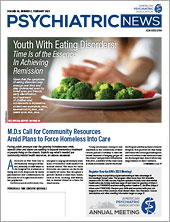APA Provides Recommendations on New Health Care Directory
The Centers for Medicare and Medicaid Services (CMS) asked for input on establishing the first National Directory of Health Care Providers and Services (NDH). In comments, APA expressed its support for such a directory but urged caution in creating a directory that may not meet the intended goals.
“There are current examples of directories that are well done, and for the most part accurate, but many more examples that have not served the intended purpose while duplicating effort and increasing reporting burden,” APA wrote in its letter, addressed to CMS Administrator Chiquita Brooks-LaSure. “Through thoughtful planning, consultation with stakeholders, and rolled-out implementation, an NDH can be successful for all audiences.”
APA made the following recommendations about the directory:
•
Note clinicians who use telehealth technologies and the states in which each is licensed to practice.
•
Update the directory at least annually, if not more frequently, to reflect changes in workplaces, the types of insurance clinicians accept, and whether a practice is accepting new patients.
•
Note the physician participants who work in an integrated behavioral health model such as the Collaborative Care Model.
•
Allow clinicians who work out of their homes or other private locations to indicate that they don’t want private information shared.
Coalition to Stop Opioid Overdose Supports Due Process Continuity of Care Act
The Coalition to Stop Opioid Overdose (CSOO), of which APA is a member, wrote a letter expressing its strong support for the Due Process Continuity of Care Act (S 2697, HR 3363). The bill would amend the Medicaid Inmate Exclusion Policy, which currently denies Medicaid coverage to people who are incarcerated, and extend coverage to individuals who are awaiting trial, known as pretrial detainees.
The letter was addressed to the bill’s sponsors in both the House and Senate: Sens. Bill Cassidy (R-La.), Jeff Merkley (D-Ore.) and Ed Markey (D-Mass.) and Reps. Paul Tonko (D-N.Y.), David Trone (D-Md.), Tom Emmer (R-Minn.), and Michael Turner (R-Ohio). The CSOO includes more than 20 addiction, mental health, recovery support, harm reduction, and health care professional organizations.
“Individuals who are incarcerated have high rates of chronic diseases, including substance use and mental health disorders, and disproportionately low incomes, meaning many of these individuals qualify for Medicaid coverage,” the CSOO letter states. “About 65% of individuals who are incarcerated in jails in the U.S.—an estimated 490,000 people—were awaiting court action on a current charge in 2019.”
The letter continues: “Ensuring pretrial detainees maintain their Medicaid coverage is not only commonsense, but it represents an important social justice issue as many pretrial detainees remain in jails simply because they cannot afford financial bail—and would otherwise have access to their healthcare coverage.”
APA Urges Senate to Pass VIPER Act
Last November, the House passed the VIPER, or VA Infrastructure Powers Exceptional Research, Act (HR 5721). APA and more than 80 organizations sent a letter to Sens. Jon Tester (D-Mont.) and Jerry Moran (R-Kans.), chair and ranking member, respectively, of the Senate Committee on Veterans Affairs, urging them to work to pass the bill in the Senate.
The legislation would provide greater authority and resources to improve the functionality and efficiency of the VA Medical and Prosthetic Research Program, including formally authorizing the VA’s Office of Research and Development. Additionally, the bill would exempt the VA from the Paperwork Reduction Act requirements when it enters certain contracts or agreements for research activities.
Last year, the VA issued guidance that prohibits VA employees involved in research from receiving compensation from outside sources, including an affiliated nonprofit medical school. “This policy will be highly disruptive to thousands of research projects focused on improving veterans’ health led by VA scientists, many of whom have joint appointments with nonprofit medical schools,” the letter stated. The VIPER Act would exempt VA researchers, allowing them to receive outside compensation and ensuring the continuation of important research projects “that have the ability to improve the health not only of our veterans, but all Americans.”
APA Opposes Proposals to Criminalize Medicine
APA anticipates that bills to restrict gender-affirming care and reproductive freedom will continue to be introduced in state legislatures. Most recently, the Florida Board of Medicine voted to ban gender-affirming care for many transgender youth, the first decision of its kind to be made by a state board of medicine.
APA has voiced strong opposition to these state legislative proposals, which prohibit physicians’ ability to deliver safe and necessary medical care. The APA State Government Relations team is available to assist district branches and state associations in opposing these proposals. Contact Erin Berry Philp at
[email protected] for more information. ■
